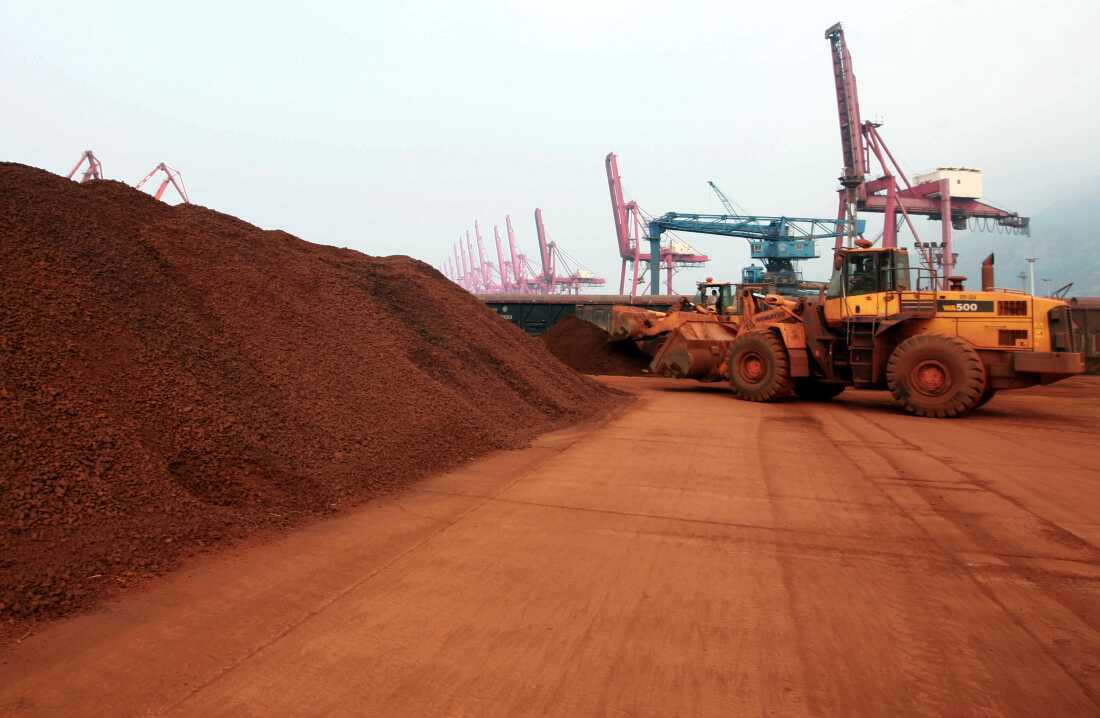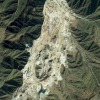A uncommon earth minerals mine in China’s Jiangsu province, photographed in 2010.
/AFP by way of Getty Photos
conceal caption
toggle caption
/AFP by way of Getty Photos
With names like neodymium and dysprosium, rare-earth components sound unique — and their perceived shortage has solely added to the mystique.
In actuality, uncommon earths aren’t that uncommon, however simply tough to extract and refine. But they’ve grow to be indispensable to fashionable life, embedded in every part from our smartphones and electric-vehicle motors to wind generators and medical imaging machines.
And demand is climbing.
The actual choke level is processing and refining — a fancy and environmentally delicate step that the U.S. has lagged behind in and that China now dominates, controlling almost 90% of world output.
The necessity for high-torque, compact EV motors — which use rare-earth magnets which are three to 4 occasions stronger than typical magnets — helps drive demand. Manufacturing of those motors is hovering by roughly a 3rd every year. Navy plane additionally rely closely on these components; one RAND estimate suggests an F-35 accommodates over 900 kilos of rare-earth supplies in its engines and electronics.
Taking a private-public method
To scale back reliance on international provide, the White Home is pursuing U.S. self-sufficiency in rare-earth manufacturing. The federal authorities beneath President Trump has supported the sector in ways in which depart from conventional free-market rules. Slightly than relying solely on personal business, the federal authorities has adopted a technique much like China’s, offering a whole bunch of hundreds of thousands in loans and even taking stakes in key mines and startups.
Indiana-based ReElement Applied sciences is among the many beneficiaries of this authorities backing. Earlier this month, the Trump administration introduced a partnership between the Pentagon, by way of its Workplace of Strategic Capital (OSC), ReElement and Vulcan Components, a North Carolina based mostly agency that produces rare-earth magnets for navy purposes.
ReElement says it has developed a extra environment friendly, environmentally pleasant technique of rare-earth processing and recycling that includes chromatography. The corporate operates a commercialization facility in Noblesville, Ind., with a bigger manufacturing web site in Marion, Ind., slated to return on-line subsequent 12 months.

Stacks separate uncommon earths at ReElement’s Noblesville, Ind., plant.
ReElement Applied sciences Corp.
conceal caption
toggle caption
ReElement Applied sciences Corp.
ReElement Applied sciences CEO Mark Jensen says confidently that by the top of 2026, “we’ll be the largest producer of rare earth oxides in the United States.”
As a result of China’s dominance in refining is so nice, the U.S. benchmark for achievement is modest, in keeping with Bert Donnes, a analysis analyst at funding banking agency William Blair.
ReElement, in partnership with Vulcan Components, goals within the subsequent few years to provide 10,000 metric tons of neodymium-iron-boron magnets used not solely in EVs, but in addition wind-turbine mills, hard-disk drives and MRI machines. Even that bold goal is a fraction of the roughly 230,000 tons produced globally in 2024, in keeping with the Institute of Electrical and Electronics Engineers, or IEEE.
“I would say if you see those numbers, you think this is going to be a massive facility,” says Donnes of ReElement’s present operation. “It isn’t.”
In comparison with a standard processing facility, ReElement’s operation is compact, he says, serving to keep away from any “not-in-my-backyard” (NIMBY) backlash. “So it’s not like people are scared of this process. Maybe they don’t know about it as much because you can keep the process so small,” he says.
How the U.S. misplaced its lead
Beginning within the Nineteen Eighties, China started surging forward of the U.S. and the remainder of the world in uncommon earth manufacturing. Across the similar time, environmental considerations mounted on the solely main U.S. uncommon earth mine, Mountain Cross in California, the place spills of radioactive and poisonous wastewater — byproducts of refining — raised alarms.
Mountain Cross is an open-cut mine the place they “drill and blast, blend their types and locations in the pit” earlier than grinding the stable supplies into smaller particles, in keeping with Kelton Smith, a lead course of engineer for mining at Tetra Tech, a world consulting and engineering providers agency. A flotation course of then concentrates the uncommon earths which are in flip leached with hydrochloric acid.
The California mine needed to halt manufacturing a number of occasions over time on account of environmental considerations. Throughout that point, it modified possession and finally filed for chapter safety earlier than being acquired by MP Supplies in 2017, which reopened the mine.
The troubles at Mountain Cross helped China to realize a foothold and finally overtake the U.S. in uncommon earths — simply as demand for them was rising. Beijing now produces about 60% of the world’s provide of those substances, in keeping with the Worldwide Vitality Company. China additionally holds a considerable quantity of the world’s confirmed reserves of the ores that include these components — roughly 34%, in keeping with the U.S. Geological Survey, however a number of different nations — together with the U.S. — have substantial reserves as properly.
Trump’s commerce battle with China has made the squeeze in uncommon earths much more acute. As a result of the U.S. lacks the power to course of uncommon earths on a big scale, MP Supplies has needed to ship its ore from Mountain Cross to China for refining. However no extra. As an alternative, the corporate is having to ramp up its restricted functionality to course of the ore on-site.
Additional complicating the difficulty are expanded export controls that Beijing introduced final month that require international firms to acquire a license with the intention to promote merchandise abroad that include Chinese language-sourced uncommon earths.
Aaron Mintzes is deputy coverage director and counsel at Earthworks, a nationwide group centered on stopping the antagonistic impacts of mineral and vitality improvement. “What we’re urging … is to do that processing in ways that reduce energy and water intensity and toxicity,” he says.
Brent Elliott, a analysis affiliate professor of geology on the College of Texas, estimates the U.S. has enough sources to satisfy demand. “It’s about the extraction potential and the logistics of getting it out of the ground in a way that is environmentally sensitive but also socially responsible,” he says.
Partly as a result of it’s environmentally messy, with poisonous byproducts, Beijing has gained a bonus by ignoring these penalties. “China can do it faster and better because they don’t have the environmental concerns that we have,” Elliott says.
Many specialists agree that the U.S. has sufficient reserves however lacks the processing functionality to associate with it. Simon Jowitt, a geologist and the director of the Nevada Bureau of Mines and Geology, says there are a variety of uncommon earth deposits within the U.S. which have potential, but it surely’s hardly ever a simple proposition.
“You need a source of the rare earths, some way of transporting the rare earths, some way of concentrating the rare earths, and some way of putting those rare earths into a form that they can then be extracted,” Jowitt says. “If you don’t have one of those, then you end up with something that isn’t a mineral deposit and you’ll never get anything out of it.”
Final 12 months, China decreed new laws for uncommon earth processing that embody strict environmental and security laws, but it surely stays to be seen how stringent enforcement will probably be.
In the meantime, it not solely processes its personal ore, but it surely imports uncooked ore from locations like Southeast Asia and Africa. It is a part of a broader technique by China to set itself up as a world hub for uncommon earths, in keeping with Gracelin Baskaran, director of the Crucial Minerals Safety Program on the Middle for Strategic and Worldwide Research.
“They put a lot of state resources behind building processing capabilities, such that the minerals come from different places and then they get sent to China for refining,” Baskaran says. “What China has been extraordinarily good at is connecting their foreign policy to secure rare earths from around the world.”
A brand new course of and federal investments
Refining is the place ReElement is available in. The corporate makes use of giant columns in a specialised filtration course of developed at Purdue College to extract and purify precious metals from uncooked ore, but in addition recycled uncommon earths from outdated magnets. The method is extra environment friendly and fewer environmentally damaging than older strategies, similar to these utilized by China.
Jensen, the ReElement CEO, says that technique, generally known as solvent extraction, is “ecologically challenging” and tough to scale. “It’s a dead technology,” he says, including that his firm’s final aim is not essentially to attain U.S. dominance, however to provide sufficient uncommon earths domestically to interrupt China’s monopoly.
The One Huge Stunning Invoice handed in July appropriated $7.5 billion towards securing crucial minerals. Days later, the Pentagon’s Workplace of Strategic Capital introduced a $400 million funding in MP Supplies, making the U.S. authorities the corporate’s largest shareholder. The Pentagon company plans additional investments in “[c]ritical components, raw materials, and rare earth elements utilized in microelectronic manufacturing.”
As a part of the cope with ReElement, Vulcan Components will get a $620 million mortgage from the Pentagon’s OSC with an extra $50 million supplied by the Division of Commerce beneath the CHIPS and Science Act signed by former President Joe Biden. ReElement Applied sciences will obtain an $80 million mortgage to assist the enlargement of its recycling and processing operations.
“I think we’re making big strides now because of all the grants and all the critical-mineral-focused grants coming out,” says Elliott, the College of Texas geology professor. “I think it really can set us up for success.”







